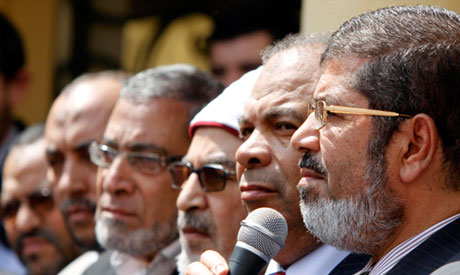
The Freedom and Justice Party (FJP) has rejected a proposal by revolutionary groups that presidential elections be held ahead of schedule in January 2012. In a press release issued on the Muslim Brotherhood’s English website, the party explained that the proposal “fails to appreciate the requirements approved by all parties in the Constitutional Declaration – which provides for elections of the People's Assembly, then the Shura Council [upper parliamentary house], drafting the new constitution, and finally the presidential elections.”
On Tuesday, the Youth Revolution Coalition and We are all Khaled Said group held a press conference in which they announced they will be adopting an initiative to elect a new president straight after parliamentary elections on 25 January, the first anniversary of the uprising. This, they see, as a way for power to be transferred from the military to a civilan authority at the soonest opportunity.
The Muslim Brotherhood-affiliated FJP, however, begs to differ. For the party, holding presidential elections early not only runs against the constitutional declaration, but would fail to solve the “crisis.”
Turning to the military’s violent attacks on protesters since a crackdown on the Cabinet sit-in on 16 December, the party said that the constitutional right of peaceful protests and sit-ins should be upheld. As for the victims of crackdowns on protest, “procedural steps” should be taken to assure the “granting of the martyrs’ families their constitutional rights.”
The statement also said the party “emphasises the need for SCAF to offer an apology for the use of so much violence, to pledge not to repeat the same practices in the future.”
Countering the official line that the fire in the Scientific Institute, destroying its historic collection dating back to Napoleon’s invasion of Egypt in 1798, was started by protesters, the party stated its belief that “the young people who protected the Egyptian Museum with their own bodies during the January 25 revolution cannot be the saboteurs who set fire to the Scientific Institute.”
Another option flatly rejected by the FJP is that of transferring presidential powers to the speaker-elect of the People’s Assembly. Such a move has been endorsed by some political forces, but for the FJP it is “incompatible with the Constitutional declaration” announced by the military council upon a Constitutional referendum in March.
Referring to the ongoing parliamentary elections, the FJP points out that incidents of violence in Egypt coincide with the voting stages, hinting at an intentional disruption of the electoral process. The completion of a democratically elected People’s Assembly, believes the party, is a necessary prerequisite to ending the violence. In the first round of voting, the FJP and its electoral alliance secured 49 per cent of the seats on offer.
Ending on a note familiar in Egypt, the FJP declared that Egypt is the target of “some domestic, regional and international stakeholders [who] do their worst to abort or derail the glorious revolution of Egypt.”
The military rulers did not escape the party’s glare with the SCAF being called upon to “identify the ‘hands’ that disrupt Egypt’s security and fuel crises, referred to by [SCAF member] Major-General Adel Emara during a press conference [Monday] and also referred to by the Egyptian Prime Minister (sic) [Saturday].”
No comments:
Post a Comment